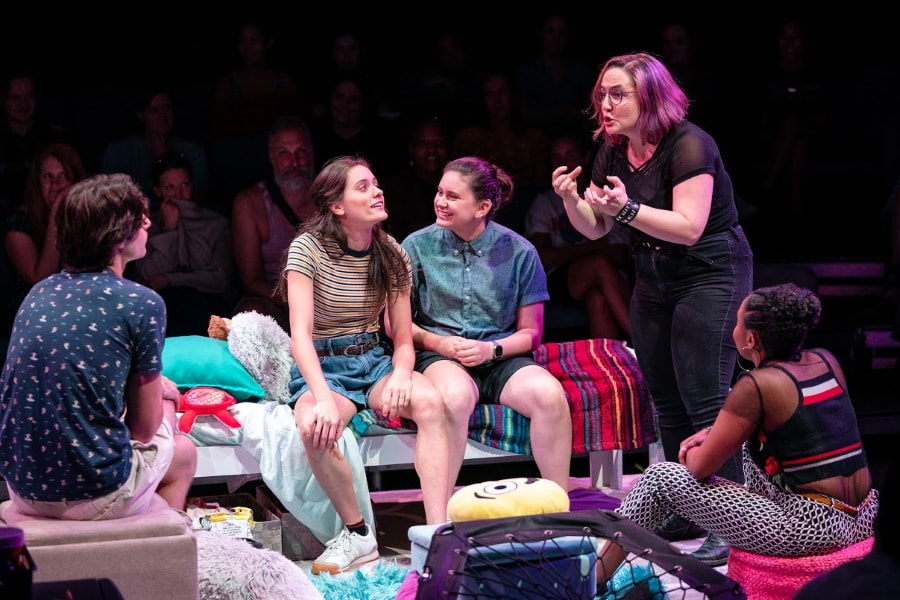In 2017, 41 percent of female-identifying and 18 percent of male-identifying students reported experiencing sexual assault at Tulane University in New Orleans. Since those stats were released, there have been town halls, support groups, class discussions, consent campaigns, and institutional initiatives. There was also a play, which a group of students devised in response to the staggering statistics. Roleplay was performed on campus, free of charge, Sept. 5-15.
When the results were revealed in 2018, says Jenny Mercein, head of undergraduate acting at Tulane, it was “the first time that I saw a large group of Tulane students being so vocal, so passionate, so mobilized, and demanding change.” Mercein has experience creating docudramas, she co-created X’s and O’s about football and brain trauma that traveled through the American theatre a few years ago. “I was energized. Something had to be done.”
Mercein went to adjunct theatre faculty member Darci Fulcher, who was already working with documentarian/ethnographer Katie Mathews on a response to the assault data. Mathews was commissioned by Tulane’s Taylor Center to co-lead Project IX: Student Design to End Sexual Assault, a one-off course envisioning change on campus.
“I didn’t need the statistics to know what it felt like on campus or to understand how students were talking about sex, rape, or consent,” says Fulcher. “I remember thinking, this feels like a group of people who feel misunderstood, and feel lost, and they’re asking for help.” Fulcher, a specialist in movement, began considering how actor training at Tulane could help students understand the body language of consent.
Then, the Goats got involved.
Goat in the Road Productions, that is. This 11-year-old interdisciplinary performance ensemble in New Orleans is led by co-artistic directors Shannon Flaherty and Chris Kaminstein. Although Goat’s competencies are diverse, with two things they’re particularly virtuosic: investigative performances and educational engagement. Often those fields overlap, as the troupe creates original work at the intersection of history, society, and class, with a site-specificity that seems to fixate on the textures of trauma. Whether it’s pharmaceuticals, post-traumatic stress, yellow fever, or quarter-life crises, Goat in the Road jams with science, sociology, and New Orleans.
Fulcher is a member of the Goats. So is Dr. Denise Frazier, a violinist who got her Ph.D. at Tulane. Frazier works at the university’s New Orleans Center for the Gulf South and sits on Goat’s board. (I too am a member of the board.)
Together, Frazier, Kaminstein, Flaherty, Mathews, Fulcher, and Mercein devised the Roleplay procedure. For more than a year, these professional artists collaborated with an ensemble of 11 Tulane students to develop scenes and characters from structured improvisations during periodic intensive workshops. Transcripts of the improvisations were turned into a script about sex and power at Tulane.
With the university’s blessing, Fulcher and Kaminstein co-directed, and Mathews filmed a documentary, recording the students in and out of rehearsal.
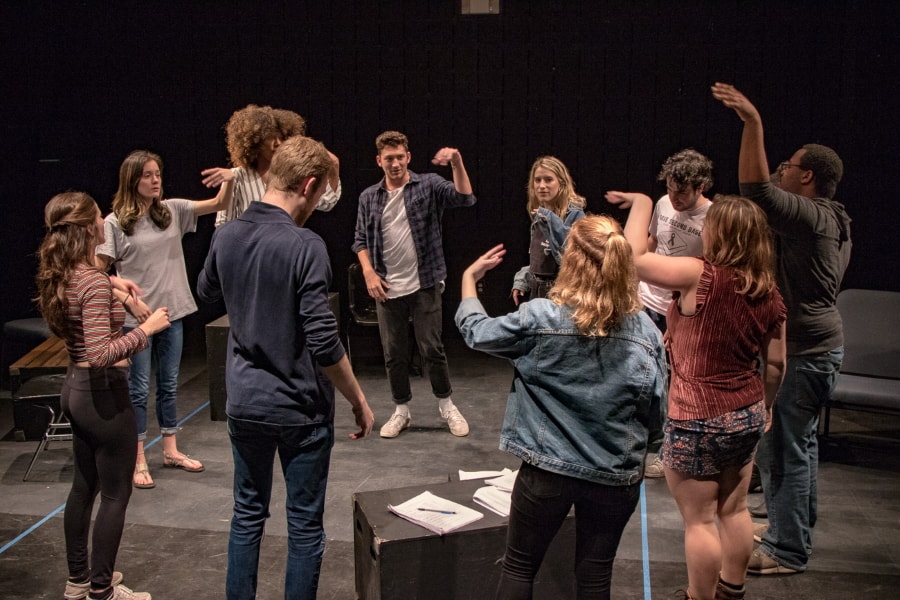
I grew up a few blocks from Tulane and spent more than a decade working at the university’s theatres. There are a few things you should know: Tulane is an elite university and a large employer. For a school in a bend of the Mississippi River, the campus’ older architecture is dissonantly reminiscent of New England. Feral cats dot the grounds, icons of campus counterculture. On an outer quadrant of the campus is Newcomb, a former women’s college absorbed within the last decade by Tulane.
On the edge of Newcomb is a mix of school-owned, residential, and commercial property. It’s a well-known hotbed for public drinking in a city with no laws prohibiting open containers. Crammed within a few blocks are frats, sororities, dives, and the school’s various denominational religious centers. There’s a paraphernalia store called the Mushroom above a bar called the Boot. After midnight, at “Boot-o-clock,” some blocks fill up with people like it’s the French Quarter.
McWilliams Hall, home to the university’s Department of Theatre and Dance, is in the elbow of it all. The Boot is half-a-block away. A few doors down from the theatre is a fraternity house that used to host “Old South” balls and recently erected a “Make America Great Again” wall.
Along with its academic prestige and low acceptance rate, Tulane’s unique social culture affects its allure. The Princeton Review consistently ranks Tulane as one of the nation’s top party schools. New Orleans, right? Partying is just part of the deal.
“It’s a culture that we’ve become complacent with,” says senior Alexandra Elam. “Tulane has become complacent. We’ve just kind of accepted it. I remember my freshman year, my R.A. told me the frats I need to avoid because they’re known for drugging drinks. ‘Avoid this frat, this frat, this bar.’ Wait a minute: Why is the onus being put on us as incoming freshman girls? That, to me, was a blow to the gut. On top of trying to figure out who I am in college, I’m also forced to walk around with pepper spray for fear of walking from the Boot. No student should live with that level of fear or anxiety on their own college campus. And that’s why I wanted to be a part of this show.”
The student participants, whom Elam notes are “social media natives,” learned about the project, surprisingly, in the old-fashioned way: via campus flyers and word of mouth. “When I auditioned, I wasn’t really fully aware of what it was,” says Aaron Avidon, a junior encouraged to audition by his roommate. “I just stumbled upon it.”
Though some of the student-actors are theatre majors, others aren’t. Some only had experience in high school productions or a 100-level class, a la the Fundamentals of Acting. Roleplay’s ensemble, then, was less conservatory and more community. And there were growing pains.
In an interview, one actor admitted they almost missed the audition. Another confessed they didn’t realize they had a show that night. Hangovers occasionally hovered over the process. In rehearsals, there were problems with lateness; mandating that tardy cast members take coffee orders helped solve that. There were issues with retaining information; repetition fixed that.
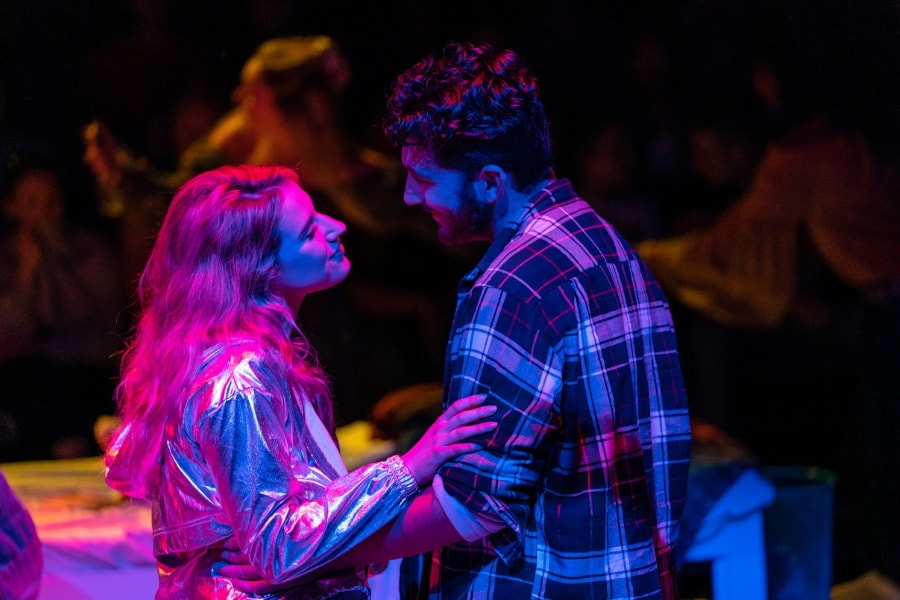
At some points, Roleplay was about being a role model; in other cases, it was about reversing roles. When the first draft of the play was released, the professional artists learned they had to step up to lead and step back to be led. The draft’s intention did not match its impact. There was fallout.
“I was kind of devastated,” says Miranda Kramer, a Louisianian who arrived at Tulane on a full-ride pre-med track. Around the same time that Kramer switched her major to theatre, she came out as gay. “I was like, I don’t see myself in this. And I don’t know why I’m part of this if there’s nothing being reflected back that’s of me.”
Elam felt similarly. “I came on to this project because I saw it as an opportunity as a female student of color to be able to voice my thoughts about my Tulane experience,” she shares. “Reading that first draft of the script, I was gutted. It came down to a matter of who gets to tell whose story.”
In 2016, Tulane’s undergraduate body was 80 percent white in a city that is 60 percent Black. The student newspaper at Tulane has reported that queer-identifying students feel vulnerable at a school that exudes heteronormativity. The campus climate survey revealed that within the undergraduate LGBTQIA+ community, 51 percent of female-identifying students and 44 percent of male-identifying students reported having experienced sexual assault.
Hate-based intimidation has been reported at the Boot. Frazier advises students of color not to pass in front of the bar; people have been called the n-word there. “This university has a deep colonial history,” says Frazier. “Location is very important, understanding where you are. A lot of these things haven’t changed over time. It’s our reality.” Inseparable from the story of an unsafe culture is race and identity. For some actors, the first draft of Roleplay didn’t acknowledge that painful fact.
The backlash to the first draft was tough for everyone. “It was the hardest experience we went through, and it was the most valuable,” recalls Mercein. “The content of that first draft was very heteronormative and very centered on fraternity culture. And that made a lot of people in the room feel like their voices weren’t being heard.”
“We knew there were holes in the script,” Fulcher reflects. “It’s hard when you’re handed a printed something, and you’re thinking: This is it. [The students] don’t know Goat in the Road’s process. They didn’t know how many more drafts we would make. Chris and I are white and straight, and they didn’t trust us—because they didn’t know us. And that was hard. We had to re-encourage them that, we want your voices, voices are missing, trust us to tell us these stories.”
The professional team made changes. Students were given roles as editors and writers, not just improvisers and reporters. New topics came into focus. “It’s all about the space the faculty creates,” says junior Hannah Gordon. “The content is derived from the student’s experience. I shared a lot in that room. A lot of the improvised scenes are based on reality. We were able to get to that point because of the trust in the room. If you don’t have that inherent level of trust, there’s going to be an encumbrance in the creativity and message.”
Both the students and the professionals had to learn from each other. The professional artists needed to learn about the student’s experiences, and the students needed to learn about how a play is made. Stories are personal, first drafts are imperfect, stakes are high, conversations are necessary, and confrontation, in theatre, is key.
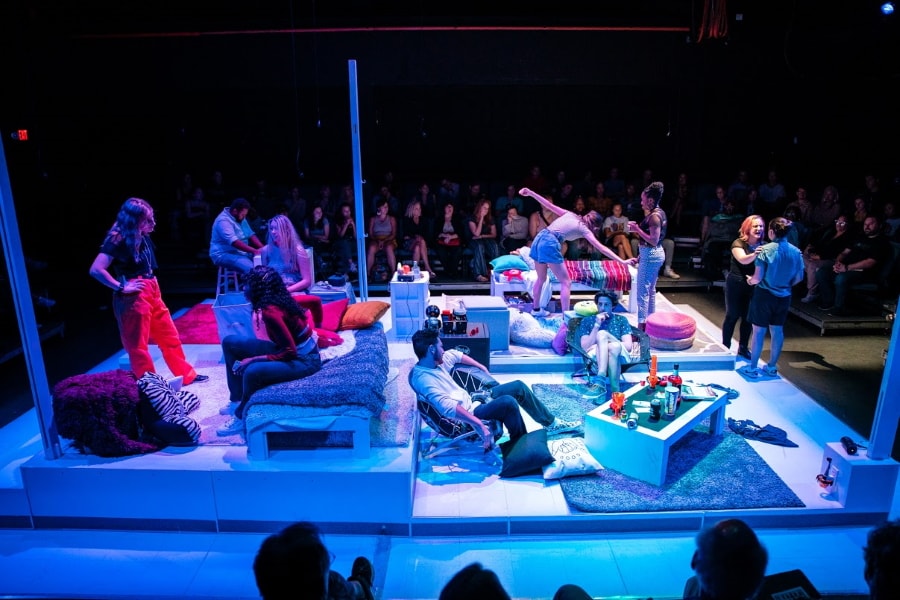
Roleplay’s dramatic structure mirrored the progression of an academic year: by season. Seasons change. Characters grow or disintegrate as the college experience rolls on. College propels some and leaves others behind. Kevin Griffith’s set design evoked the bizarre living conditions of college: people randomly piled on top of each other. In dorms, shared living can lead to high drama.
In stylized stage movement, we saw frenzied pre-gaming, and small moments of smudged connections between friends, lovers, assaulters, and survivors. “Optimize your time,” Nagelle LeBoyd’s character, Zoe, insisted. That phrase reverberated with Tulane students who like to “work hard and play even harder.”
Other themes were mixed into the jungle juice of a plot: bingeing, partying, ghosting, panic attacks, ambiguous texts, privilege, abuse, hangovers, expectations, trauma, invisibility, sexuality. In the round, we took the dangerous ride of college together, journeying from innocence to experience with 11 characters in 90 minutes.
Some moments triggered me. Like a scene in which Gordon’s character, Nikki, and LeBoyd’s Zoe fighting to make it through the fog of excessive drinking—gently rocking, close to vomiting, trying to be okay as the world keeps swirling. Their portrayals felt so dangerous and real, I nearly got out of my seat. One other person did.
Tulane’s Counseling Center, CAPS, sent staff members to the rehearsal process. Literature on sex, respect, and consent was available in the lobby. The Sexual Trauma Awareness Project (STAR) and the New Orleans Family Justice Center had counselors at the ready every night.
“I wish all the frat boys could come see it,” Gordon told me opening weekend. “Even if they write it off as stupid, it’s still going to engender some thought. My friends are telling me that it made them think differently. They’ve had those conversations. And they’re onstage for a reason. We’re putting those words onstage for you to be like, ‘Wait, I’ve said those things. Is that wrong? I’ve partaken in that behavior. What does that say?’”
When it came to inviting their parents to a show about sex, cast members were mixed. Avidon grew up in a sex-positive household and was excited for his parents to travel from Florida to see the show. Gordon invited her mom, but was on the fence about inviting her dad and brother. (Her dad ended up flying from Israel to see her.)
“They know that I’m gay, but they’re—especially my mom—she’s more not-okay with it,” Kramer says of her parents. “She loves me; she just doesn’t support my lifestyle. So, I told her: ‘This probably isn’t a play you want to see.’” The parents of Kramer’s girlfriend showed up instead.
Roleplay made clear that competitive universities are pressure cookers. The things that make a school prestigious can also be the very things that unbalance their motivated young people, provoking reckless choices. The student-actors I spoke with recalled a period of being crushed by stress. For Gordon, this show was a reason to stay at Tulane. “To be crass, I was going through some really fucked-up shit,” she says. “I was just a young, stupid person trying to function. To have something to feel passionate about, to meet people I’ve never met before…I don’t want it to end.”
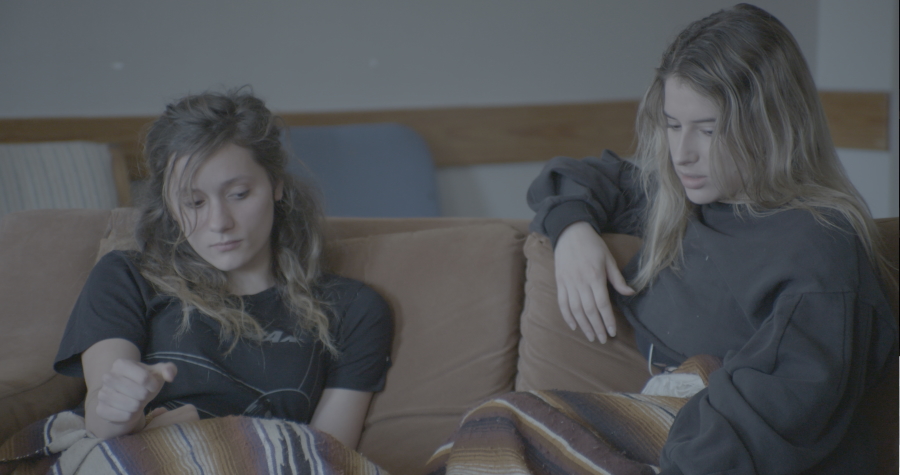
It’s only been a few weeks since the performance closed, yet I tried to measure the Roleplay Effect. Faculty and students noted that after Tulane president Michael Fitts raved about the performance on his Instagram, he announced open office hours. A university spokesperson insisted that Fitts made the office hours decision before seeing the play. Citing the production as an “important ally,” Fitts told me,“theatre and other art forms offer powerful platforms to reflect student experiences.”
President Tania Tetlow of Loyola University New Orleans also attended. Tetlow, a former Tulane administrator, once ran Tulane Law School’s Domestic Violence Clinic (and led a turnaround with the New Orleans Police’s sex crimes unit). “I thought the play did a magnificent job of representing the complexity of students’ lives and the pressures they are under without seeming like a trite morality play,” Tetlow shared with me. “The depth of the characters built empathy for those experiencing sexual assault; it also built understanding of how easily students can violate their own values and commit sexual assault. That empathy is critical for prevention efforts.”
A week after the show closed, police arrested a Loyola student on allegations of sexual battery—at the Boot. Tulane campus police recently announced they plan to build a police substation directly across from the bar.
The Goats plan to interpret data from audience surveys from Roleplay. Flaherty estimates that out of the 1,000 people who saw the show, 60 to 70 percent were students. Tulane enrolls roughly 8,600 undergraduates. The house held 157 a night.
Student audiences have reported responses to the artists directly. These, Mercein says, are the most gratifying. The student newspaper wrote that Roleplay “felt like an accurate portrayal of college life as opposed to the distance created when adults attempt to portray ‘youth culture.’” As Avidon put it: “It’s crazy, because this is real fucking life. The audience sees it, and they gravitate towards it. They think, That’s fucking me up there!”
Outside the theatre, peers and faculty have approached the student-actors—a rarity on a campus not known for theatregoing habits. “In the most selfish way possible, the Roleplay cast has gotten so much campus recognition,” laughs Gordon. “People come up to us constantly. They see the cast members hanging out, and someone was like, ‘Roleplay forever, huh?’ My goal was to reach at least one person, and that goal is far surpassed—and that’s an incredible feeling.”
As Kaminstein points out, despite prognostications to the contrary, theatre isn’t irrelevant to new generations. As Federal Theatre Project leader Hallie Flanagan put it in 1940, “The theatre, often regarded by members of its own profession as dying or dead, still has tremendous power to stir up life and infuse it with fire.” It was true then as it’s true now: If the work is brave and vital, it’s relevant.
At Tulane, one official knows what the Roleplay Effect is—because she’s seen it before. “This is the second university I have worked at where the theatre department collaborated with students to make pieces about campus issues,” says Meredith Smith. “Each time, that fearlessness to learn about students’ lives led to performances that really advanced the conversations in the community.” Before Tulane, Smith worked at Northwestern in Chicago. At Tulane, she’s assistant provost for Title IX Compliance, and her office investigates all complaints concerning sexual harassment.
Smith’s advice to theatremakers and professors who want to create an alliance with students on the issues of their campus community? “What made this play so honest is how true it was to their experiences,” Smith notes. “Embrace whatever the truths are about their lives, good or bad, banal or shocking. If your goal is to have real conversations about these issues, let the students be real with you. I feel like I understand them more because of Roleplay, and that is invaluable.”
Although the set is struck and performances are done, another wave of the Roleplay experience awaits: the documentary. The film “follows specific students in their lives, informing the understanding of the work they are bringing to the stage,” says Mathews. With production about to wrap, editing about to begin, and fundraising ongoing, Mathews anticipates a 2021 premiere.
Alex Ates is a writer at Backstage. He is from New Orleans and is a board member of the American Alliance for Theatre and Education.
Roleplay’s costumes were designed by Ellen Bull, scenic design by Kevin Griffith, props by Owen Ever, lighting by Joan Long, and sound by Dylan Hunter. Stage managed by Kit Sternberger. Roleplay’s student team of writers and creators included: Aaron Avidon, CJ Briggs, Ross Brill, Robert Holmes à Court, Alexandra Elam, Hannah Gordon, Grace Graugnard, Annalise Harknett, Noah Hazzard, Hannah Kent, Miranda Kramer, Nagelle LeBoyd, Hailey Mozzachio, Lucy Sartor, and James Weiss.

